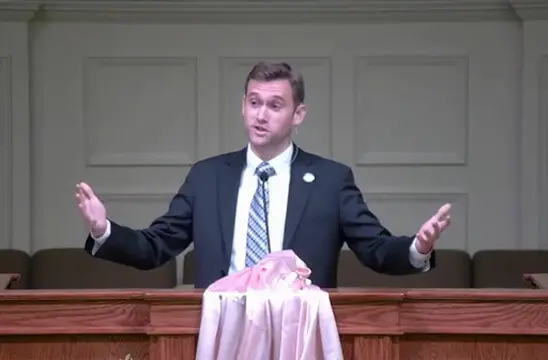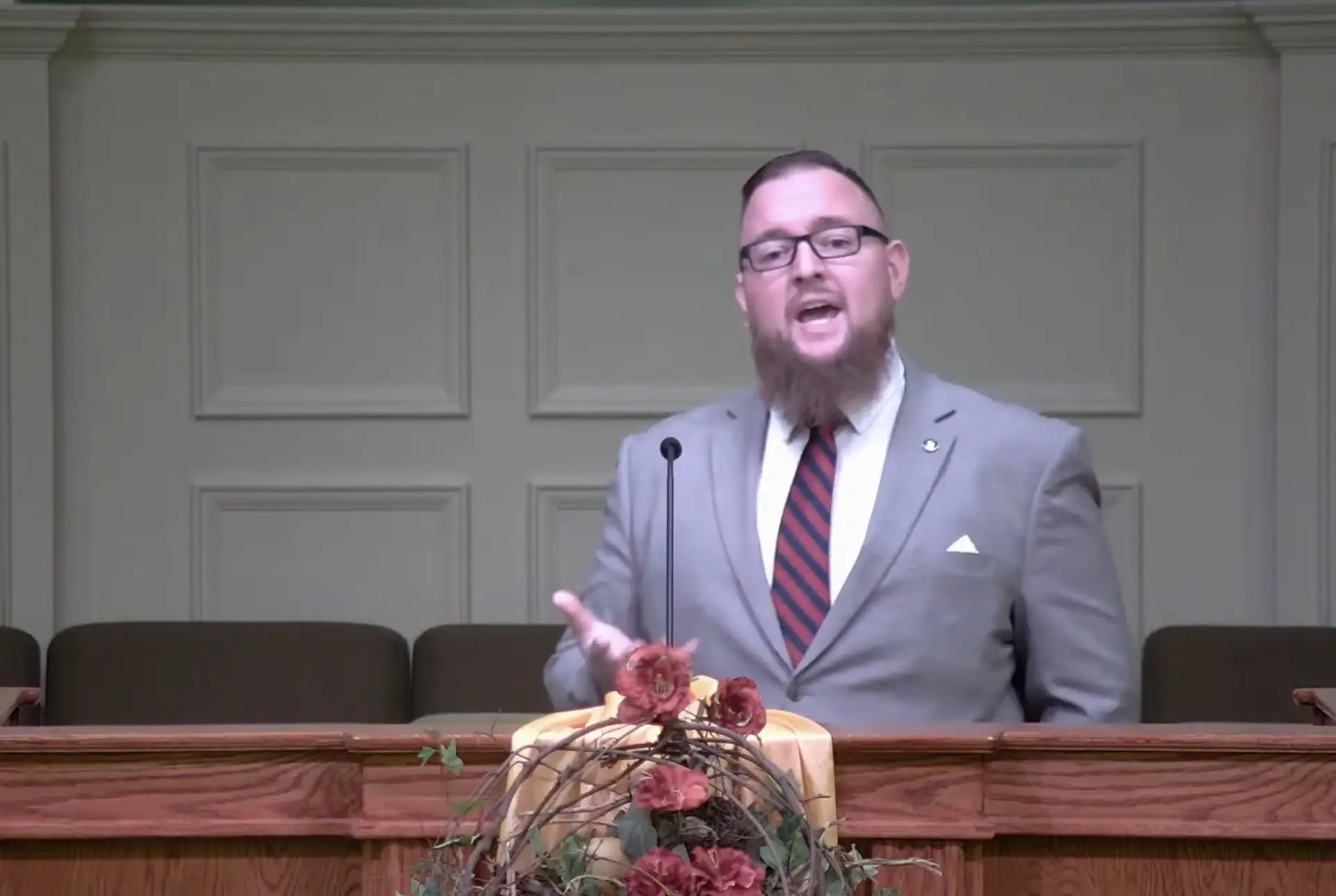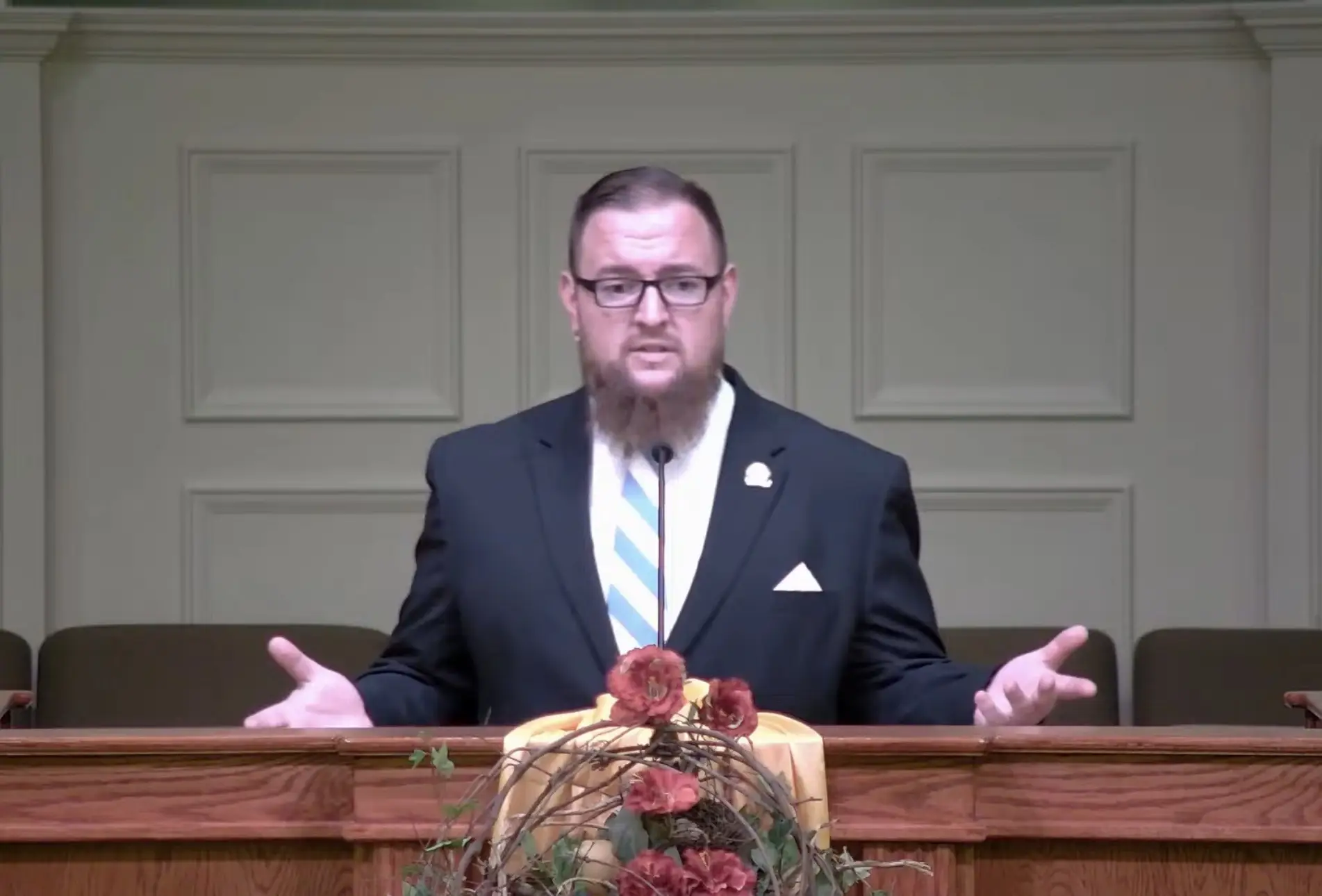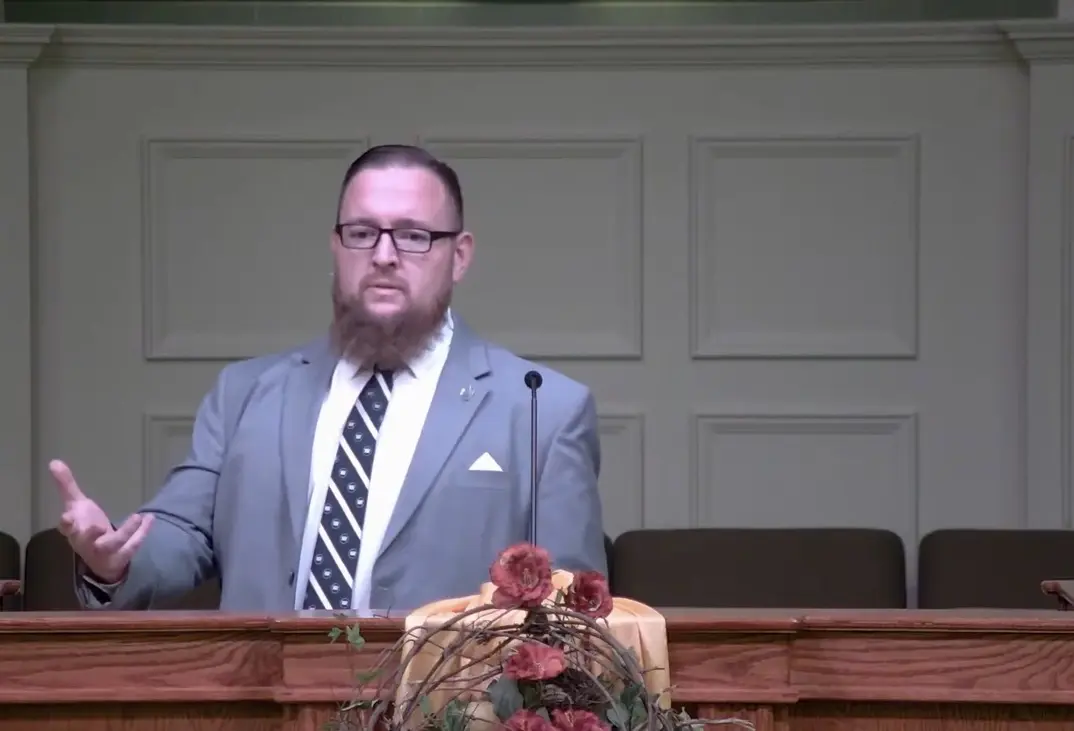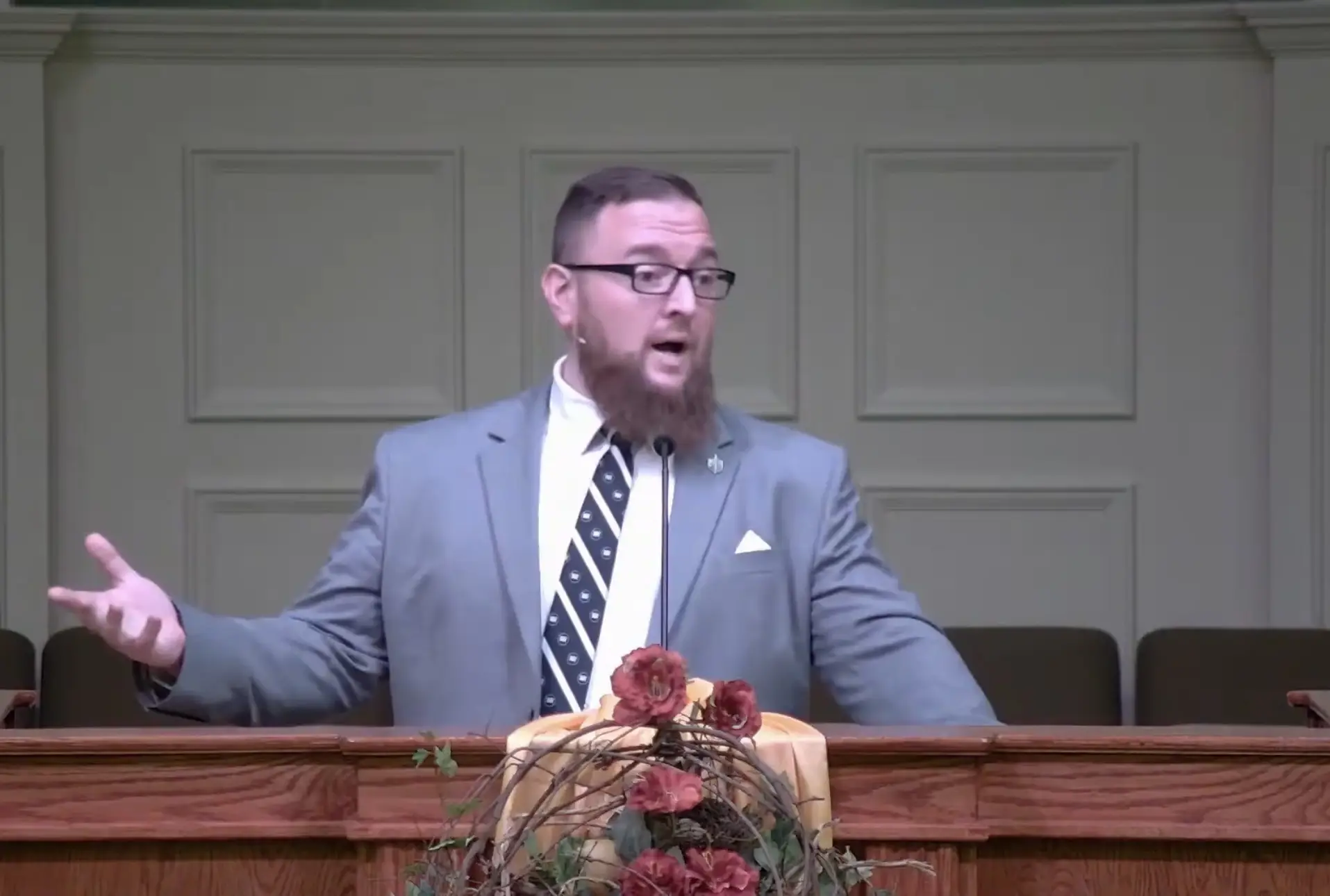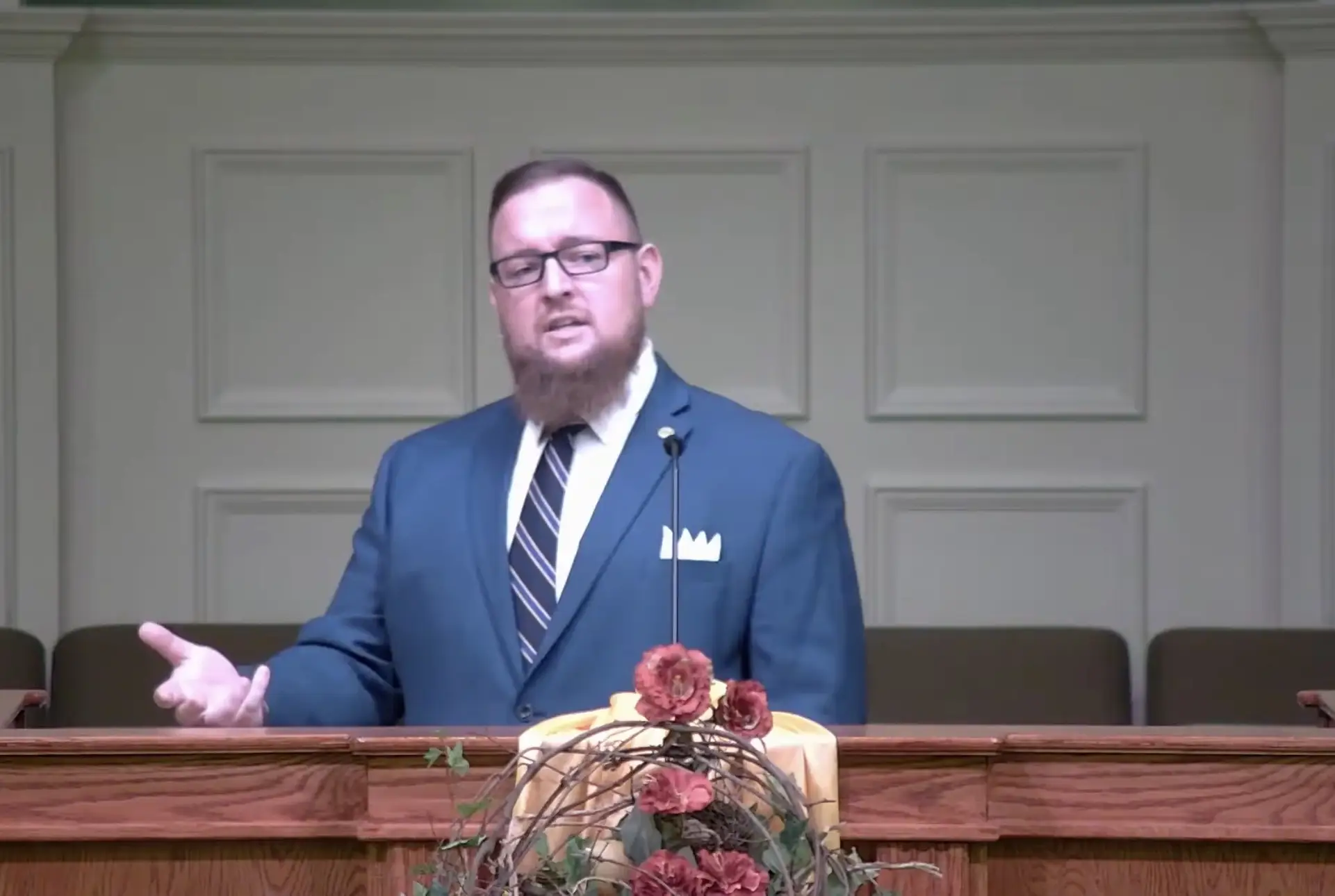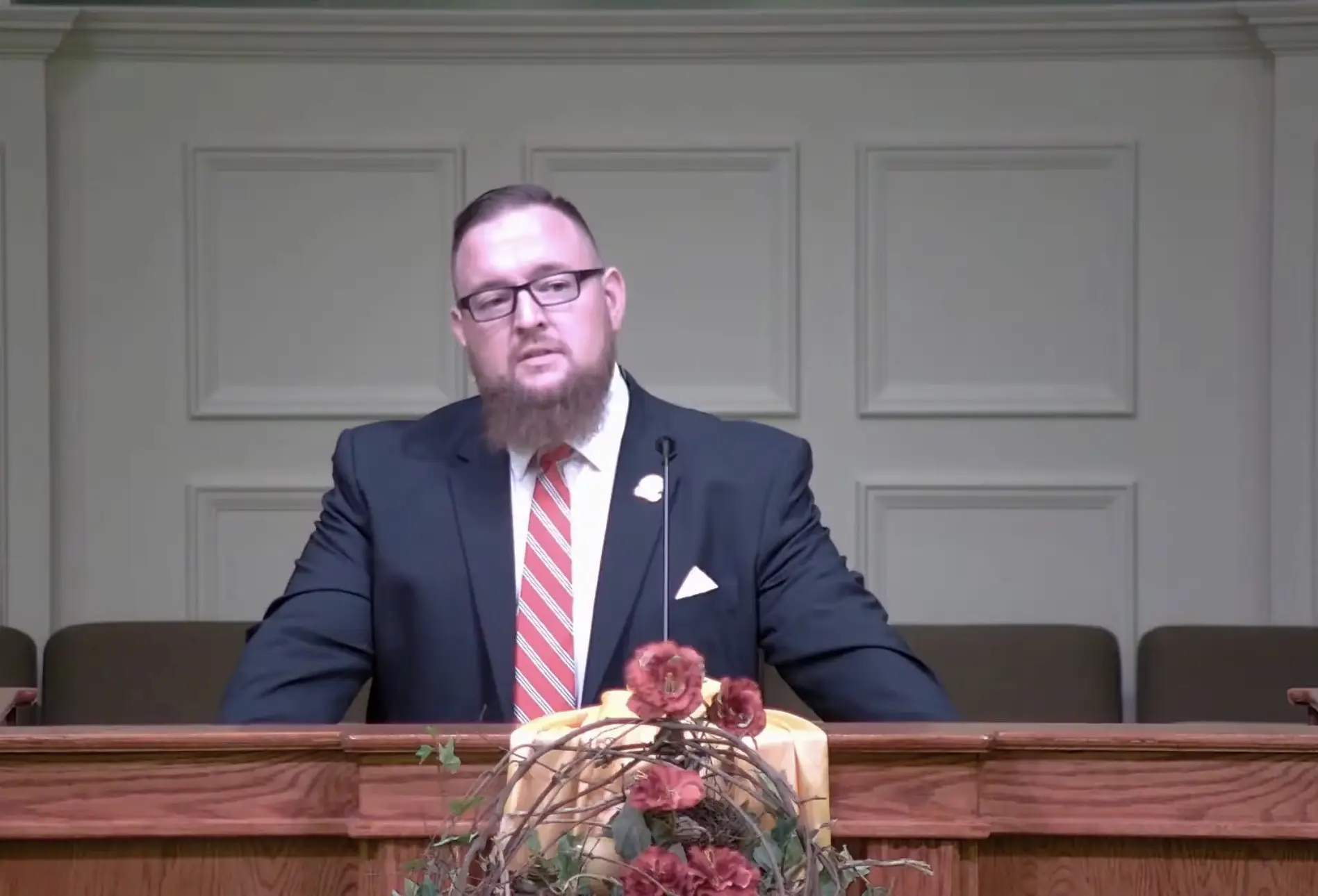Video
“Slaves of Christ”
James 1:1
Pastor R. Stephen Kretzer II
05/25/2025
Audio
Transcript
It’s always exciting as a new pastor because you finally be able to get to, you’re able to pick a sermon series. Usually, for those of us who are in seminary and such, our sermon texts are given to us, or we don’t always get to pick what we want to do, but it’s exciting to be a new pastor and pick what you want to do. And as young seminary students, they always, at seminary, will recommend us, your first sermon series, do 1 John, because 1 John typically has the easier Greek. Johannine literature in general has easier Greek.
Well, you know, Pastor Ryan, about a year or so ago, decided to do 1 John, and now he’s going through John. and I’m not quite ready for revelation. So, we’re gonna do the book of James, which is a beautiful letter and a wonderful book. We’re just doing the first verse this morning, an intro, but I’m gonna go ahead and read verse one and then we’ll open in prayer. James, chapter one, verse one. James, as inspired by the Holy Spirit, writes, James, a bondservant of God and of the Lord Jesus Christ, to the 12 tribes who are dispersed abroad, greetings.
Let’s pray. Heavenly Father, we thank you for this day. We thank you for your word, your holy and inerrant word. We thank you for the letter of James that you allowed and caused James to write this letter with so many beautiful instructions for how to live the Christian life. And I pray that you bless this time and your spirit speaks through me as I preach this morning. In Jesus’ name, amen.
We all, as living as human beings on earth, have experienced change. Change is a part of the human experience. It’s a part of life. Things change. Borders change. Even in recent days or recent years with different wars that have gone on, the borders between countries have changed. Companies change. Every year it seems like there’s a new phone that somehow has changed from the previous model. But change is a part of life, something we have to become accustomed to, get used to, even though we don’t like it always. Our last night in Louisville, I actually went to the seminary and I wanted to sort of have one last walk. And they have this beautiful lawn on the seminary with kind of a rectangular shaped sidewalk that goes around it. And I was just listening to some music walking around that sidewalk on a beautiful spring evening.
Spring, Floridians don’t really know what spring is, but it’s like when the weather’s like 72 degrees, and it’s wonderful, but it was a beautiful evening, and I was walking around, and I was reminiscing, and I was thinking about all the changes that had taken place in my life, and that were about to take place. In reality, all I was doing, I was remembering what God has done in my life, and just thinking of how grateful I am. But I was thinking about how just not even three years ago, my wife and I, Carrie, were married on this very spot.
And then two weeks later, we moved to Louisville. I started seminary classes. In less than three years, I finished them. You called me to be your pastor. And just the amount of changes that had taken place. And I was thinking about the next great big change coming as a pastor, and the excitement, but also the nervousness, and the responsibility of the role of an elder, pastor, bishop, overseer. But also recognizing that this is the desire God has given me, and I am submitting to the Lord’s will, and I am excited to be here. But change is a part of life.
Now people don’t change, at least their natures apart from Christ don’t change. But they bring about changes. And throughout the history of the world, there have been major shifts that have brought about change. And the first century, which was when this letter was written, was a time of great change and a time of great flux. It’s when James wrote his letter to Jewish Christians. Most scholars believe it was written about the mid-40s, and actually many scholars think it was one of the first New Testament books written. Some will say it’s the first one written. But this was a time of great change in the known world.
The Roman Empire, its borders were expanding. In the 40s, the mid-40s, Rome conquered southern Britain. The city of London was established, which is now one of the greatest metropolises in the world. Emperors changed in the mid-40s. Emperor Caligula was reigning, then Emperor Claudius took over. So there was great change. But one of the greatest changes, and most importantly, the greatest change, was the dawning of the New Covenant era. Christ came to earth, he died, he rose, and he ascended, and when he ascended, the Holy Spirit came down, inaugurating what we are now living in, the new covenant era, or the church age. Christianity, Christians.
The first generation of Christians were being used by God to take the gospel to the nations. The church was going through rapid change. The trade routes and the roads of the Roman Empire allowed Christianity to spread like wildfire. It was being taken everywhere, throughout the empire. It was world Christianity, it was world changing. Now God is the one who ultimately brings about this change, but he uses Christians, he uses individuals to bring it about. We are his instruments that he uses. And it should be noted that the teachings of Jesus and the teachings of the Old Testament that were spreading through the world at this time, were antithetical to the teachings of the Roman Empire and the godless pagan religions that were popular and thriving during this day and age.
It was common when you walked into a Roman home, there was a shrine, a house shrine, that you would pay respects to, to whatever the god might have been in that shrine. But Christians would not pay respect to the shrines. Emperor worship was popular during this time, but Christians would not partake in emperor worship. Christians stood out. They were distinct. They were different and that was how God used them. They were distinct and different and that was what brought about change in some ways. It was the gospel. But people noticed that Christians were different during this time. It’s similar to how in the Old Testament when we look at the law and the law that God gave the Israelites, the Mosaic law, part of the specific reasons, one of the specific reasons for the law was that the people of Israel were to be distinct and different from all the other nations surrounding them.
That was the way God would use them to bring about change. But these Christians in this first century needed to be instructed how to act. They needed to be taught how to be Christ’s followers, how to act like Christians. What a follower of Christ looks like in an ever-changing world, in a world that is hostile to the gospel. Pastor Piatt has said for many, many years, the world is no friend to grace. And that has been since Adam and Eve sinned. So in the Roman Empire, the world was no friend to grace.
Now, yes, Christians, they have the Holy Spirit, as if you’re a Christian here today, you have the Holy Spirit within you that will illuminate the scriptures for you and will instruct you and grow you. But the Holy Spirit also sets certain men apart to teach. And we see that, and that’s how it’s always been. In the Old Testament, you had priests and prophets who taught the people. And in the Church Age, the New Covenant era, you have elders, pastors, and even teachers who are set apart to teach, to instruct. So Christians need to be taught. We need to be always learning. And this, in this letter, this letter from James is what we see in these five chapters. He’s instructing these churches, these Jewish Christians, how to live as Christians, how to be Christ followers.
How are they to live in a world of change? And the foundation for the way they are to live is their status in Christ. Their status in Christ as being slaves of Christ. And what we see in this passage, in just this first verse, is that belonging to Christ means submitting to him. submission to him. And this submission to him will lead to living a faithful Christian life. Some brief context, the author James is the half-brother of Jesus. We read in the Gospels, Matthew 13, 55, that he was one of Jesus’ half-brothers. And what’s interesting is in John, chapter seven, we read that James, at the time of his brother’s time on earth, was actually not one of his followers. He did not follow his own brother, Jesus, during the time while Jesus was alive. But what’s interesting is after he died and rose and ascended, James became one of the great leaders of the early Christian church in this time of change.
Acts shows us that he was one of the elders in the Jerusalem church and one of the great leaders there. And actually Acts 15 verses 13 through 21 describes how James was the one who declared at the Jerusalem council that Gentiles were not bound to the old covenant laws. In Acts 15, we see that certain Judaizers were coming down and teaching the Gentiles you had to be circumcised, you had to follow these certain laws. So the Jerusalem council was convened where they needed to address these issues. And you see in that chapter, James stands up and says, after listening to Peter’s sermon, these Gentiles are not bound by these laws.
So he not only was a founding pastor in Jerusalem, but he seems to be just a leader in this early church. In fact, Galatians 2.9 describes him as one of the pillars of the Jerusalem church. So he had the brother Jesus, who during Jesus’ lifetime was not one of his followers, but after his death became a great follower and actually submitted to him. And it’s beautiful to see how God can save anyone in quite the turnaround in James’s life. And he was believed to have been martyred around AD 62. And it’s clear from the first verse that it seems to be written to Jewish Christians that are living outside of Jerusalem. We see that he says the 12 tribes, and he uses the word dispersed. 12 tribes is a pretty distinct phrase, most likely referencing to the ethnic Jewish Christians. And the dispersion kind of echoes back to the time when Assyria conquered Israel in 722 BC, and Babylon conquered Judah in 586.
So those two terms really seem to indicate that he’s writing to ethnic Jewish Christians. And they may have left, they may have been dispersed outside of Jerusalem, in the areas around Jerusalem, they may have been dispersed due to persecution. James, there’s various opinions and debates by people on how to understand its structure, I think it’s best to understand it as a series of sermons or even a series of mini-sermons that he’s delivering to these individuals or that he’s writing out. And whenever you’re looking at a book of the Bible and you’re studying it, you’re trying to find the major themes. And the major themes help you understand why he’s writing the letter.
So in the first chapter of James, he pretty much lists out a lot of his themes that he’s going to expound upon as the book goes on. And he talks about partiality, he talks about not favoring the rich, he talks about being a doer of the word, not just a hearer, he talks about living out your faith.
So these major themes that he talks about are probably some of the issues that were going on in some of these churches, these house churches in the areas outside of Jerusalem. He’s describing how Christians are to live and act in an ever-changing world. And living and acting like a Christian starts with recognizing our status as slaves of Christ and submitting to him. Which brings me to my first and only point. Submit to Christ. In James’s opening verse, I’m gonna read it real quick again.
James, a bondservant of God and of the Lord Jesus Christ, to the 12 tribes who are dispersed abroad, greetings. This opening verse shows not only who he’s writing to, so he’s writing to these Jewish Christians, but it also shows to whom he belongs, whom James belongs to. And those whom we belong to, we submit to. He’s about to explain how Christians are to live their lives. This is how you are to live, practical Christian living. But before he does that, he wants to ground his teaching in his status in Christ. He belongs to Christ, James belongs to Christ, and this dictates how he will live and act in the world. Ontology precedes function, meaning that what you are dictates what you do. A moving truck moves things. I worked on a moving truck for a while in Louisville, and we move things. A runner runs. A soldier fights.
Now, these individuals have other roles, obviously, but in those specific roles, as a soldier, your job is to protect, defend, and fight. So his role dictates what he does. And that’s what James is saying here. As slaves of Christ, submitting to his commands and will, We are to act like him. And being a Christian is, simply put, but it’s important to remember sometimes, being a Christ follower. So James is saying, as a slave of Christ, a slave of God, and the Lord Jesus Christ, that is who my status is in. And because that’s who I belong to, who my status is in, that dictates how I will act in this world. It dictates how you, these Jewish Christians, will act in this world. James’ identity and belonging to Christ dictates what he’s going to talk about in the rest of the letter, in these five chapters. He identifies himself as a slave of God and of Jesus Christ. Dr. Rob Plummer, who is a professor at Southern Seminary, actually was one of my New Testament professors, points out that the references of God and Lord Jesus Christ next to each other seem to be an implication to the Trinity.
People sometimes when they comment on James, scholars will comment on it and say there’s not a lot of theology in James, which is wrong. There is. Every book of the Bible has theology. Sometimes you have to look a little closer maybe than others, but that right there is an example of the theology of James, a reference to the Trinity and the equality of God and Christ. Now Doug Moo, another New Testament scholar, helpfully points out that James writes, Lord Jesus Christ, which is a reminder that he is the promised Messiah and the Lord of all whom we must submit to. So he’s writing to these Jewish Christians, who the Jews, for hundreds and thousands of years before Christ came to earth, were awaiting the promised Messiah. And Christ came, and now he’s sitting at the right hand of God now.
So he’s writing to these Jewish Christians to say, hey, the Lord Jesus Christ, the Messiah and the Lord, whom we submit to. He’s saying, my Lord and Savior. We’re talking about Christ, and when we’re talking about salvation, the words Lord and Savior always need to be put together. Sometimes people like to think of Him as just their Savior, because if you think of Him as your Savior, you think how He saves you from your sins. But if you forget Lord, you forget the part that we still have to submit to Him, and that He’s Lord of our lives. And James is saying, hey, He’s my Savior, He’s your Savior, and He’s the Lord of our lives. We must submit to Him. So I think those two words, Lord Jesus Christ, are important there. I think that’s why they’re there. And for those who have given their lives to Christ, we are his slaves.
Now slave, I should clarify this, because I keep talking about the word slave, but if you’ve heard me read from my translation, it says a bond servant. I read from the NASB. One of the reasons I like the NASB is because it is very similar to what Pastor Ryan reads out of the Legacy Standard Bible. The Legacy Standard Bible does translate the Greek word doulos as slave, which seems to be the best translation of the word. Mine does bondservant, which gets at the same idea of a slave. But it does seem the best way to translate the word. So slave seems the best translation as opposed to the word servant. Many modern translations that are good translations will have this word as servant. And the Greek word that is used in the original manuscripts is one that always referred to those in bondage who were the subjects of their masters.
So it referred to slaves, people who are in subject to other people who have no rights. And this was the word directly used for slaves. And if James, as inspired by the Holy Spirit, wanted to use the word servant, he probably would have used the Greek word diakonos, which specifically refers to service or servant. So it seems that this is the word that we need to understand is being used and the proper way to understand it as slaves of Jesus Christ. And obviously, it’s hard for us, it’s hard for anybody in the world to Think of the word slaves in a positive way, a positive connotation, especially here in America with our history on such things. But when we’re coming to the scriptures, especially something written in the first century, we need to remember. that we don’t bring our context and our history into the Bible and read our lives, our history through scripture. We read scripture and then see how that is meant to be, applies to us. We see the world through scripture’s lenses and not our lens.
So when we come to scripture, we can’t think about, we have to remember that our nation’s history, even how we understand slavery isn’t how we’re meant to understand it here. This is what this passage is wanting us to do by the use of the word slave. We cannot view the world how we understand it, but how James meant for it to be used, how this word to be used, this word slave to be used. and how they understood it in those times. And James, as inspired by the Holy Spirit, seems to be emphasizing the total submission required of Christians. I think that’s why this word slave is used, and it’s important for us to understand it. Jesus is our Lord, and we are to submit to him. And James is telling them, hey, as Christians, to live your lives faithfully and genuinely, it starts with submission.
If you’re a Christian, it starts with submission to Christ, and a slave submits to their master. And the word submission means total dependency, total dependency on Christ. And this is what the Christian life is to look like, dependency, which is the total antithesis of us and our state apart from Christ. We’re trying to depend on ourselves and live for ourselves. But the Christian life is all about submission. Slaves had no rights in this time and were totally dependent on their masters. All of who they were belonged to their master. They needed their masters like James and his audience of these Jewish Christians and us need our master Christ Jesus. We need Christ. And James is showing in this verse that he is submitting all of who he is to Christ. All I have is Christ. Now it’s important to remember too that as Christians, as slaves of Jesus Christ.
I mentioned how slaves, typically don’t have rights, and especially during this time, they may have had some rights, but they were still in total control by their masters, but they really often didn’t have rights. But as slaves of Jesus Christ, we do have rights and privileges. We have an eternal inheritance. And that’s a beautiful thing to remember, that as Christians and when we become slaves of Christ, it’s a beautiful thing. Because it comes with the rights and privileges, it comes with the Holy Spirit who regenerates us. Submission requires humility. And this is what we see from James here as he declares his status.
I was just the other day talking to Pastor Ryan in our offices about this very passage. And Pastor Ryan made an interesting point. He says you have the brother of Jesus, James, as we already talked about, who during Jesus’s lifetime did not submit to him. But what we see here now, what we’ve read about, what we read about in Acts, is he is submitting to him. He recognizes that, hey, my brother, is my Lord and my Savior, and I need Him. He is the Messiah. And we see the great humility that requires. Submission requires humility, which once again is not easy, but it is required and it is important.
And being a slave of Christ demands submission to Him. It’s not a recommendation, it’s not a preference, it’s a demand. God demands us to submit to Him. Christ demands submission. And it’s a good thing, too. A lot of times when we think of the word submission, especially when the word, the world, hears the word submission, they immediately want to close their eyes and just say, that’s a bad word. But as Christians, we understand it differently, and our understanding is rooted in this, that this submission to Christ is not bad, but beautiful, because we need Christ. Christ is who saves us. We need him in our lives. He’s our mediator. He’s who goes to God for us. He literally goes to God for us.
So we need Christ. And as we look at this verse and what James is writing about and we seek to apply it to our own lives, we need to be slaves of Christ. need to give our lives to Christ. And if you do not know Christ, if you don’t know Christ, you are a slave to sin.
Romans 6:16 through 20 says this. Do you not know that when you present yourselves to someone as slaves for obedience, you are slaves of the one whom you obey, either of sin resulting in death or of obedience resulting in righteousness? But thanks be to God that though you were slaves of sin, you became obedient from the heart to that form of teaching to which you were committed. And having been freed from sin, you became slaves of righteousness. I’m speaking in human terms because of the weakness of your flesh. For just as you presented your members as slaves to impurity and to lawlessness, resulting in further lawlessness, so now present your members as slaves to righteousness, resulting in sanctification. For when you were slaves of sin, you were free in regard to righteousness. Apart from Christ, we are slaves to sin. In Christ, we are slaves to righteousness. Being a slave to righteousness means you’re a slave to Christ. You have been saved.
A slave to sin means you follow what you want. You follow the ways of the world. You follow the ways of Satan and his demons, and you do what you want. And you may have momentary pleasures, momentary moments of gratification, but it is not lasting. It is not lasting peace or joy. I recently, just this week, went and saw a recent film. And one of the stars of the film was talking about how much he loved his movies, and he just loves movies, and he loves making movies. And as I was listening to him speak, I couldn’t help but think, this is this guy’s life. This is what he lives for. And I’m not criticizing movies at all. I enjoy movies. But that’s what he lives for. One project to the next. Living life for making movies. And it’s sad. He’s a slave to sin. But a slave to Christ means being a slave to righteousness.
And before coming to Christ, we follow sin and do as we please. But once Christ frees us, we can follow him. And that’s the thing about this submission to Christ, this being a slave of Christ, is it’s freedom. It’s freedom from sin. It’s freedom to live as Christ desires us to live, which is the best way to live. We must recognize that all we have been given has come from God, and remember the words of Paul from Galatians 2:20, not I, but Christ lives in me. Not I, but Christ lives in me. That should be our cry. The Christian life is marked by submission. Not I, but Christ.
Important to remember, too, that part of submitting, as I was talking about with James, requires humility. We must humble ourselves. We need to pray for humility. How often do we pray for humility? But we need to. Pride, some say, and I think is accurate, is the root of all sins. And we must pray for humility. We need Christ like a slave needs his master. Dependency, we need Christ. Dependent upon and pray for dependency. Our posture should be that of Psalm 8:4. Psalm 8 is probably my favorite psalm.
In Psalm 8, verse 4, it says this. What is a man, what is man that you thought of him, and the son of man that you care for him? That should be our posture every day. As we come to God in prayer, as we go about our life, what is man that you care for him? Who am I? Why do I deserve this? Because we don’t. But what did pastor say in his prayer? Not because we love first, but because he first loved. A posture of humility.
As some of you may already know or have been able to tell, I’m a huge history buff. I always have been. And I’ve always enjoyed studying World War II. And in World War II, two of the greatest leaders of the Allies were Winston Churchill in England and FDR of America. And Winston Churchill’s main strategy up to the point where America got in the war was to get America in the war because he knew he needed us to beat Nazi Germany. And when America finally was about to declare war, Winston Churchill actually flew over to America and he met with FDR. And it’s interesting, I was listening to a podcast the other day, and they were talking about how Winston Churchill, the Prime Minister of England, most powerful man in England, one of the single greatest leaders in human history, would actually push FDR around in his wheelchair.
The Prime Minister of England, who’s on equal playing field with the President of the United States, submitted himself in some way, put himself in a posture of humility, because he knew he needed FDR. He humbled himself before the president and served him because he knew he needed his help in beating the real enemy. So humility is important and critical in submitting ourselves. And submitting to Christ means submitting ourselves to the authorities he has placed in our lives. Whenever I was a kid and someone would tell me what to do, I never liked it. I still sometimes don’t like it as much, I just now smile instead of pouting.
But no, we are to submit to the authorities God places in our lives. That’s bosses, that’s parents, children, you need to submit to your parents and listen to what they have to say. I don’t know all the parents in here, I know some of them, but I trust that even the ones I don’t know and don’t know as well love God and want to see you children do well in life and honor him. Bosses, you need to submit to your bosses. We need to do what they say. We need to do things without grumbling.
Now this does not mean, and I want to be careful here, if they’re telling you to sin, if the government, your boss, or your parent is telling you to sin, you do not sin. That’s not what submission to those authorities in your life means. We always follow God before following man. But we read even in the scripture that we’re to submit and follow to those governing authorities God has placed in our lives, which is not always easy.
Our preaching pastor back home in Louisville, just within the past year, year and a half, preached on submitting to those God has placed in our lives. And he commented on how sometimes Christians have varying views and different opinions on who’s in the White House. And I have to say it was a very convicting sermon because he said, you may not like him, you don’t have to like him, but you need to respect the office. You need to pray for them. And I wondered, I wonder if every time we go to complain about the person in office, whether it’s the president, a governor, a senator, whoever it might be, if instead of complaining, we took time to pray for them. Which is not easy, but they need it.
And no matter your opinion on who the president, if it’s the President Biden or President Trump, it seems clear that neither one of them have a personal relationship with Jesus Christ. And we need to pray that they come to know Christ. We should want Christians in the White House. We want Christians in positions of authority. Makes it easier to submit to them sometimes. But we are to submit to these governing authorities.
Now, the ultimate authority that we submit to is, of course, Christ, but the ultimate authority that’s placed on our life is scripture, and we must submit to what it says and believe it to be true. This past Wednesday night, we had the Awanas Wards Night, and I spoke from Psalm 119, nine through 16, and I mentioned how here at Fellowship Baptist Church, we believe this book is holy, true, and perfect in everything, and we do. Modern scholastic says that, well, only the themes are important, and some of the historical details aren’t as important. Or this didn’t happen, this did happen. But if you take this book seriously and believe the themes to be true, you have to believe the details too. Because everything in here is in here for a reason. It’s the inspired word of God. And we believe it to be true and we have to submit to it.
What James is gonna talk about in these next five chapters, we need to submit to it. He’s gonna talk about partiality. He’s gonna give the example of when someone comes into a church and you favor the rich over the poor, that’s wrong. We need to submit to that teaching. He’s gonna talk about being a doer of the word, and not just a hearer. He talks about that in chapter one. We need to submit to that teaching. And we need to submit to it because James is writing, but as I’ve said numerous times, he’s writing under the inspiration of the Holy Spirit. God breathed. Submit to what the Bible says. Because submitting to scripture means submission to Christ. If you’re submitting to Christ, you have to submit to scripture.
It’s similar to how in Israel, under the old covenant, under the Mosaic law, when they submitted to the law, they submitted to God. Obedience to the law meant they were obeying God, what God had told them to do. Scripture is important. Submission to it means we’re reading it every day. And before you come to scripture, pray, Lord, I pray that you will Show me new riches and treasures in this word. I pray the Holy Spirit will provide illumination as I read. We need to submit to scripture. In a world that is constantly changing, Christ never does.
The one, our master, never changes. He is the one to whom we belong if you are saved, and the one to whom we must look to and cling to throughout all our lives. And if you are here today and you are not slaved, and you are a slave to sin, I implore you, to submit to Christ, to repent of your sins and give your life to him, and submit to him for the rest of your days. Then your life will change, but it will be for the better. If you are saved, we are slaves of God and Jesus Christ, and it is only because of our new life found in Christ that we can be Christ followers. Submission to Christ means Christ is our master, and unlike our old master’s sin, He truly loves and desires what is best for us. It’s a master who wants to see us grow and do well. And at the end of our lives, we want him to look at us and say, well done, my good and faithful servant.
To close, I wanted to read from Fox’s Book of Martyrs. I was reflecting upon certain martyrs in the early church and polycarp. was a well-known martyr in the first century. In fact, Polycarp is an interesting figure because he lived a long life and was martyred, but he actually, scholars think, was a disciple of John. Not John the Baptist, but John the disciple.
So there’s a link to an early church father and writer who had a link to one of the disciples. But Polycarp, towards the end of his life, was being sort of chased by Roman authorities because he would not submit to Caesar. He would not submit to the Roman gods, he submitted to Christ. And he was brought into an arena, and a proconsul, or a Roman authority, was asking him to deny Christ and submit to Caesar. And I want to read these brief paragraphs. The proconsul then urged him, Polycarp, saying, swear, and I will release thee. Reproach Christ. Polycarp answered, 80 and six years have I served him, and he never once wronged me. How then shall I blaspheme my king who hath saved me.
The proconsul again urged him, swear by the fortune of Caesar. And remember, this was the time in the early church where they would literally throw Christians to lions, they would burn them in carcasses, and wouldn’t just kill them, they would butcher them. And Polycarp knew this. Polycarp replied, since you still vainly strive to make me swear by the fortune of Caesar as you express it, affecting ignorance of my real character, hear me frankly, declaring what I am. I am a Christian. And if you desire to learn the Christian doctrine, assign me a day and you shall hear. So facing death, a brutal death, his response was, how can I deny and leave Christ? And I am a Christian. And if you want to know about it, let me know and I’ll tell you. He’s a life of submission to Christ, 86 years. He died at 86 years. Are we willing to submit to Christ to the very end of our lives?
Let’s pray. Heavenly Father, for those of us here who know you and are slaves to Christ, we thank you for saving us, for saving us from being slaves to sin. We thank you for the gift of the Holy Spirit indwelling us and sanctifying us. We pray that we continue to submit to you all our days, even if it means death, a brutal death, because submission to you is greater than submission to anything else. In Jesus’ name, amen.
